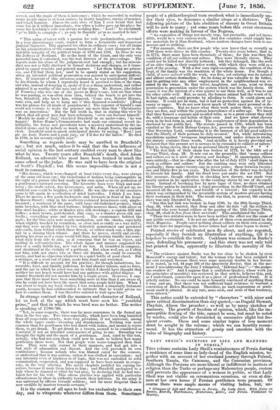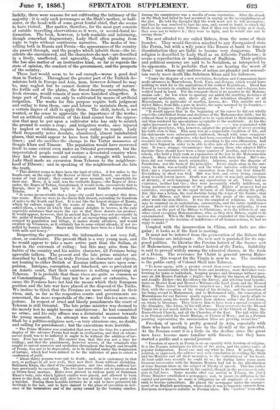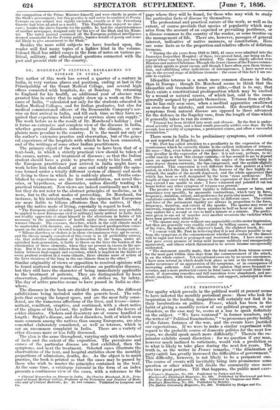LADY SHEIL'S GLIMPSES OF LIFE AND MANNERS IN PERSIA. * THIS
volume contains Lady Sheil's reminiscences of Persia during a residence of some time as lady-head of the English mission to- gether with an account of her overland journey through Poland, Southern Russia, the Caucasus, and the Caucasian provinces. Although the Persians are more liberal or indifferent in matters of religion than the Turks or perhaps any Mahometan people custom still prevents the appearance of a woman in public, so that Lady Sheil was not visible on ceremonious occasions, or even at din- ners at her own house if Persian gentlemen were present. Of agave there were ample means of visiting ladies, but, un- • Glisispies of Life and Manners in Persia. By Lady 'Shell. With Notes on lobrels, Dorkomans, Nestorians, Shiva, and Persia. Published by Murray, luckily, there were reasons for not cultivating the intimacy of the majority: it is only such personages as the Shah's mother, or half- sister, or the head-wife of some great feudal chief, that she seems to have visited. Her matter, therefore, for the most part consists of outside travelling observations as it were or second-hand in- formation. The book, however, is both readable and informing, though somewhat fragmentary, Lady Shell often passing from topic to topic without continuous narrative. The modes of tra- velli 0. both in Russia and Persia—the appearances of the country she passed through, and the peoples which inhabit them—the in- cidents she encountered, and the characters she met—are described in a lively, unaffected, and agreeable though slight manner. She has also matter of an instructive kind, so far as regards the -state of opinion, the conduct of the government, and the prospects of the country. These last would seem to be sad enough—worse a good deal than in Turkey. Throughout the greater part of the Turkish do- minions both in Europe and Asia, man, however debased he may be, may neglect but he cannot destroy the bounty of nature : the fertile soil of the plains the forest-bearing mountains, the fresh streams would remain If man were banished altogether. A large part of Persia can only be cultivated by means of artificial irrigation. The works for this purpose require both judgment and outlay to form them care and labour to maintain them., and a certain degree of skill, to apply them. The skill, indeed, is not wanted, or the sense to appreciate the importance of the 'works; but an artificial cultivation of this kind cannot bear the oppres- sion that may be put upon a cultivator who has only to scratch the ground to secure a crop ; and irrigation works, once injured by neglect or violence' require heavy outlay to repair. Lady Shell frequently notes desolate, abandoned, almost uninhabited planes, that would appear to have been fully peopled in ancient times ; and she ascribes the change to the Tartar massacres of Gengis Khan and Timour. The population would have recovered itself to some extent even under an Oriental government, but the impoverished people could not restore a devastated country when they had to commence and continue a struggle with nature. Lady Shell made an excursion from Teheran to the neighbour- hood. of Elboorz ; and in speaking of the neighbourhood she hits the truth.
" This district seems to have been the land of cities. A few miles to the South-east, on the edge of the Keveer or Great Salt Desert, are other re- mains of vast extent.; they consist of mere mounds, not remarkable for
' their size. Here it is said was the veritable Rages,—the Rages of Alex-
ander, 'the Rages of Tobias, said, it would seem, successively first to Europa, -then to Itel, and lastly to its present humble representative, Tehran.
"It seems inconceivable that a large city could have occupied this deso- late waste. Here we were in the Great Salt Desert, extending for hundreds of miles to the South and East. It is not like the honest steppes of Russia, whisli -by culture supply all the wants of man. The shootoor-khar or eafael-thorn, a briar on which that animal delights to browse, is the only vegetable substance that meets the eye or that these deserts can produce. It would appear, however, that in ancient days Rages was not necessarily in the midst of desolation. The desert is of an encroaching spirit; when not resisted by population and tillage it makes steady advances and would swallow up Verameen, as it certainly has to some extent already, if not re- pelled by human labour. Rages may therefore have been in a and flowing with milk and honey."
Respecting the government, the information is not very full, clear, or conclusive. The present Shah is a very young man and he would appear to take a more active part than the Sultan, at least in the externals of ruling ; but this may arise from the habits of the country and his native character, all Persians being agreeable talkers. The present and the late prime minister are described by Lady Shell as truly Persian in character and objects, not leaning to either British or Russian influence save upon com- pulsion. Intrigue, corruption, and falsehood, are so prevalent at an Asiatic court, that their existence is nothing surprising at Teheran. It is probable that those vices are quite as common as at Constantinople. They may not be so gross or extensive, be- cause the Persians have not had the means which their European position and the late war have placed at the disposal of the Turks. We incline to think that the Persians are more national in their vices, and, so far as the respective courts and governments are concerned, the more respectable of the two : but this is a mere con- jecture. In respect of cruel and bloody punishments the court of Teheran is still Oriental. The late prime minister was doomed to die merely lest he might become mischievous : he had committed no crime, and his only offence was a dictatorial manner towards the young monarch. An attempt was made to assassinate the Shah by a politico-religious sect,—a very atrocious one, no doubt, and calling for punishment ; but the executions were horrible.
" The Prime Minister was reminded that now was the time for a practical display, of the advance Persia had made in civilization, and that on whom- soever death was to be inflicted it ought to be without the addition of tor- ture. Fear has no mercy. His answer was, that this was not a time for trifling; and that the punishment, however severe of the criminals who sought to spread massacre and spoliation throughouethe length and breadth of Persia, was not to be deprecated, or to be included under the designation of torture, which had been defined to be the infliction of pain to extort a confession of guilt.
"About thirty persons were put to death ; and, as is customary in that sect, or perhaps in all new sects, they met their doom without shrinking. Suleiman Khan, the chief of the conspirators, and two others, suffered tor- ture previously to execution. The two last were either cut to pieces or shot. or blown from mortars. Holes were pierced in various parts of Suleiman Khan's body, into which lighted candles were placed, and allowed to burn clown to the flesh, and while still alive he was divided into two parts with a hatchet. During these horrible tortures he is said to have preserved his - fortitude to the last, and to have danced to the place of execution in defi- =est of his tormentors and -of the agony caused by the burning candles.
Among the conspirators was a moolla of some reputation. After the attack on the Shah had failed he had persisted in urging on the accomplishment of the plot. He told the disciples that the work must not be left imcomplete, and that he was resolved to bare his arm' and, sword in hand., to attack the Shah on his entrance into Tehran : that if they saw him lying sail dead, they were not to believe it ; they were to fight, and he would rise and be among them."
The sect alluded to are called Babees, from the name of their founder. They would threaten mischief to any disorganized state like Persia, but with a wily power like Russia at hand to foment dissatisfaction they are liable to become very dangerous. Their religion is described by Lady Shell as an Atheistic Pantheism ; it seems a reproduction or modification of Budhism Their politics and political economy are said to be Socialism, as interpreted by its opponents. It is probable that we are hearing the worst of them : men whose only motives of action are plunder and sensual- isni rarely meet death like Suleiman Khan and his followers.
"Under the disguise of a new revelation, Socialism and Communism have made advances in Mazenderan, Yezd, Fars, and Zenjan, which would leave nothing to wish for in the aspirations of the reddest Republican. Blood has flowed in tornints in crushing the malcontents, for terror and religious hate walked hand in hand. For the renegade there is no quarter in the Mahom- medan code ; far less when to apostasy are added the startling doctrines of universal spoliation, and, above all, of the relentless slaughter of all Mussulmana, in particular of moollas, kazees, &c. This amiable sect is styled l3ibee, from. Bib, a gate in Arabic, the name assumed by its founder,—
meaning, I suppose, the gate to heaven. * * *
"It would appear that in the beginning of his career he did not wholly reject the established forms and doctrines of the Mahommedan faith; but he reduced these to proportions so small as to be equivalent to their annulment, and thus rendered Ins speculations acceptable to the multitude. As his dis- ciples increased so did his views enlarge. — — was acquainted with one of his proselytes, who, however, adopted the principle of never avowing his faith even to him. This man was in a respectable condition of life, and his statements were subsequently confirmed, though with some exaggera- tion, by a moolla of eminence, who had been converted to Bibeeism but had recanted his errors. His conversion, according to his own aflinnation, had only been feigned in order to be able to dive into all the secrets of the sys- tem. It was a strange circumstance that among those who adopted Bib's doctrine there should have been a large number of morales, and even mooj- teheds who hold a high rank as expounders of the law in the Mahommedan church. Many of these men sealed their faith with their blood. Bib's no- tions did not contain much originality. Atheism, under the disguise of Pantheism, was the basis of his principles. Every single atom in the uni- verse, he said, was actually God, and the whole universe collectively was God; not a representative of, or emanation from God, but God himself. Everything in short was God. Bib was God, and every living creature down to each lowest insect. Death was not real—it was only another form of divinity, if such language has any signification at all. Virtue had no existence, neither had vice ; they were necessarily wholly indifferent, as being portions or emanations of the godhead. Rights of property had no existence, excepting in the equal division of all things among the godly. But this was a fiction, the real doctrine being the reign of the Saints—that is of the Bibeea, and their possession of the goods of the ungodly, in other words the non-Bibees. It was the simplest of religions. Its tenets may be summed up in materialism, commit/liken, and the =tire indifference of good and evil and of all human actions. There was no antipathy, it was affirmed, on the part of the Bibeea to Christians, or to the followers of any other creed excepting Mahommedans, who, as they slew Bibees, ought to be exterminated. '.en the Bibee meerza was reminded of this being some- what contrary to the doctrine of indifference of all human actions, he had no reply to make."
Coupled with the insurrection in China, such facts are sin- gular; it looks as if the East is moving. It must not be inferred from the persecution of the Babees that the Persians are intolerant : the new sect is punished for its sup- posed politics. So likewise the Persian hatred of the Soonee sect of Mahometans, perhaps is rather hatred of the Turks. Infidelity is said to prevail widely among the educated classes, in the form of a Deism. The reverence for Christ is general among Idaho- metans : this respect for the Virgin is new to us. The incident is the public entry of Colonel Shell into Tabreez.
"To horse again, with a greater crowd than ever ! more beggars, more lootees or mountebanks with their bears and monkeys, more dervishes voci- ferating for intim or bakhshish, heaping praises and blessings without mea- sure on All Hezret Padshah e Inglis—her Majesty the Queen of England, and junibe Elchee—his Excellency the Envoy, and uttering loud benedic- tions on Ilezret Eesi and liezret e Miriam—the Lord Jesus and the Blessed Mary. These latter benedictions surprised me ; but I afterwards learned that, with the exception of the denial of his divinity, and the assertion of his being second tollahommed, and to Mahommed only, the veneration of Mussulmans for our Saviour nearly equals our own. They rarely allude to him without using the words Hezret Flesi alehoos salim—the Lord Jesus, on whom be blessings. They believe him to have been a special creation 'of the Almighty, like Adam, by i his will alone. The reverence for the Blessed Virgin too is not much inferior to the homage of the Church of Rome, the Russo-Greek Church, and all the Churches of the East. The tall white lily is in Persian called the Goole Miriam,. or Flower of Mary.; and in a Persian painting representing the annunciation lilies are growing round her."
Freedom of speech is pretty general in Asia, especially with those who have nothing to lose by the ill-will of the powerful. At the Persian court it is a little on the decline since the great men have become more familiar with Russia ; but they have started a public and a special journal.
"Freedom of speech in Perak is on an equality with freedom of religion. It is the Persian substitute for liberty of the press, and the safety-valve of popular indignation. Every one may say what he likes. If needy, disap- pointed, or oppressed, the sufferer may seek consolation in reviling the Shah and his Minister and all their measures, to the contentment of his heart. At least until very recently he could do so ; for during latter years more frequent intercourse with the Russian Mission had led to the introduction of some Russian ideas on the subject of liberty of speech. This has rather contributed to its curtailment in the capital, though in the provinces it sub- sists in full force. Some months after our arrival in Tehran, the [late] Prime Minister established a newspaper; and, to insure its diffusion in the capital and provinces, he made it ob • tory on all employes of a certain rank to become subscribers. p the newspaper under the manage- ment of an English gentleman, whose duty it was to translate extracts from European newspapers suitable to Persian ideas. The 'leaders' were often
the composition of the Prime Minister himself, and were chiefly in praise of the Shah's government; but this practice is said not to he confined to Persia. Censure on any subject was rigidly excluded exactly as if the Petersburg Gazette had been adopted as a model. This Englishman enjoyed no sine- cure ; besides the above Gazette for the public, he had the superintendence of another newspaper, designed only for the eye of the Shah and his Minis- ter. The latter Journal contained all the European political intelligence deemed unsuitable for the Persian public, besides details of gossip and scan- dal likely to give amusement to the Shah." '
Besides the more solid subjects we have touched upon, the reader will find many topics of a lighter kind in the volume. Colonel Sheil has added essays in the form of notes on various po- litical, military, and ethnological questions connected with the past and present state of the country.




































 Previous page
Previous page